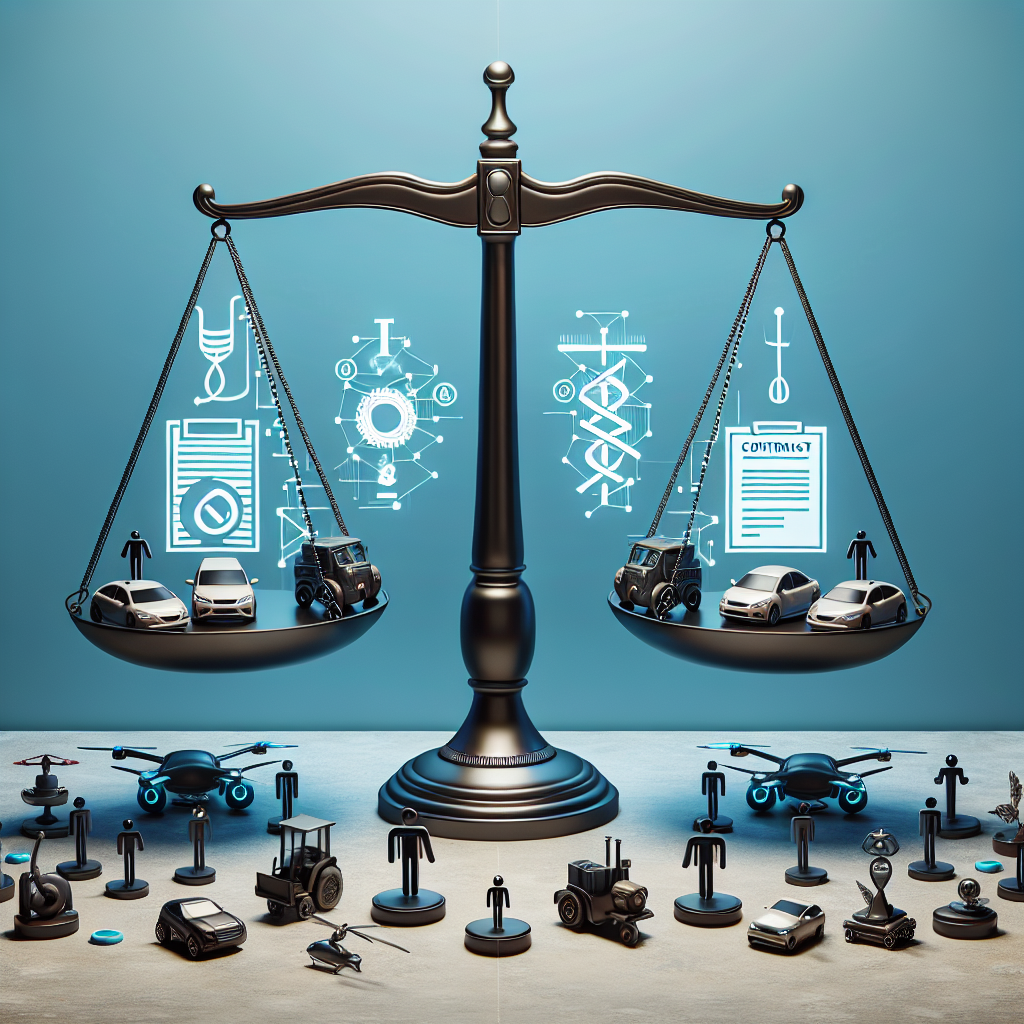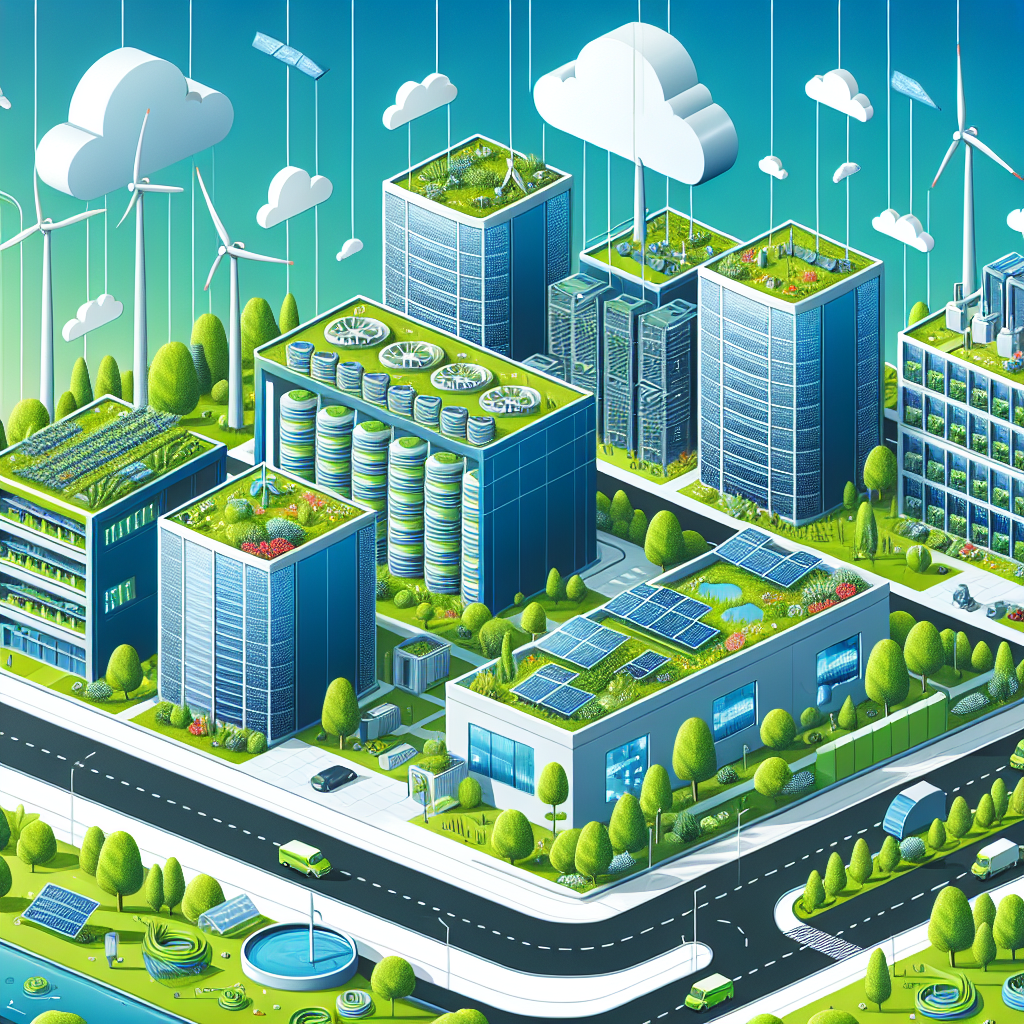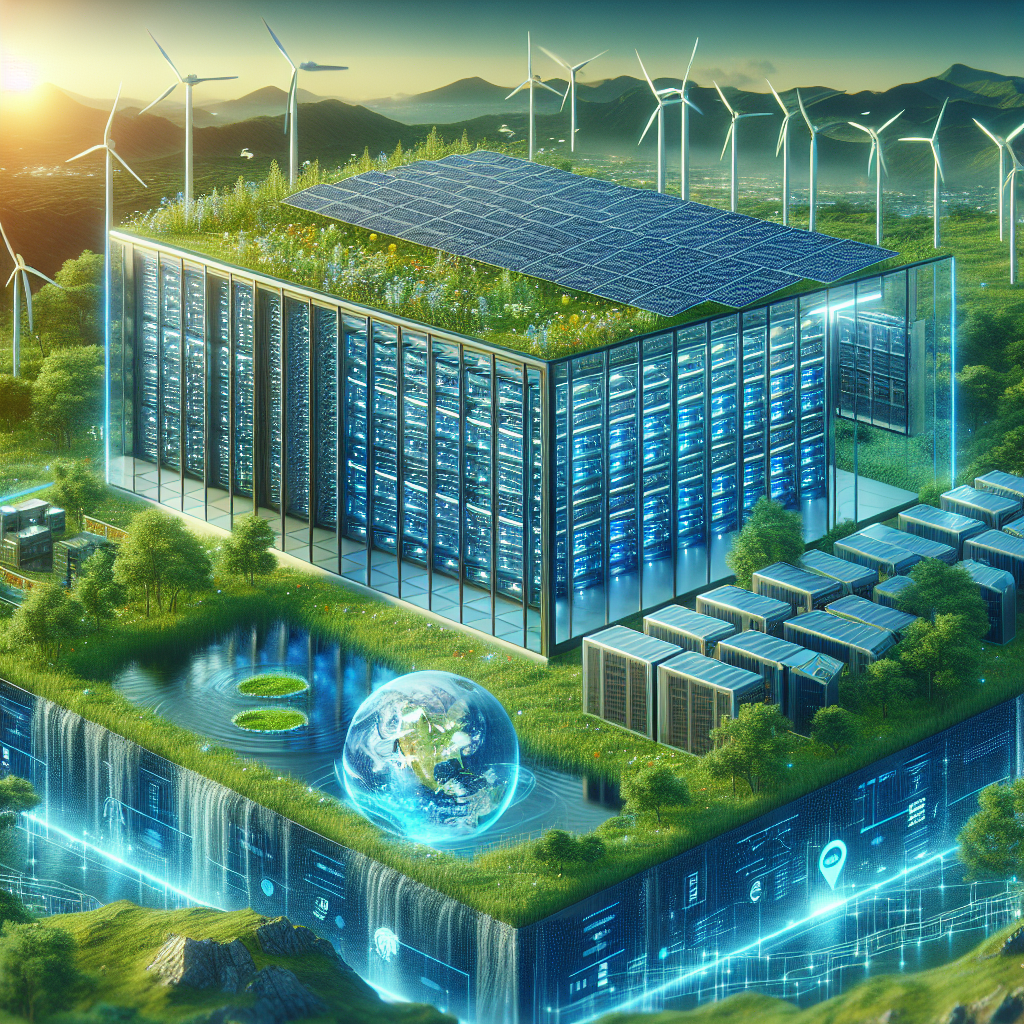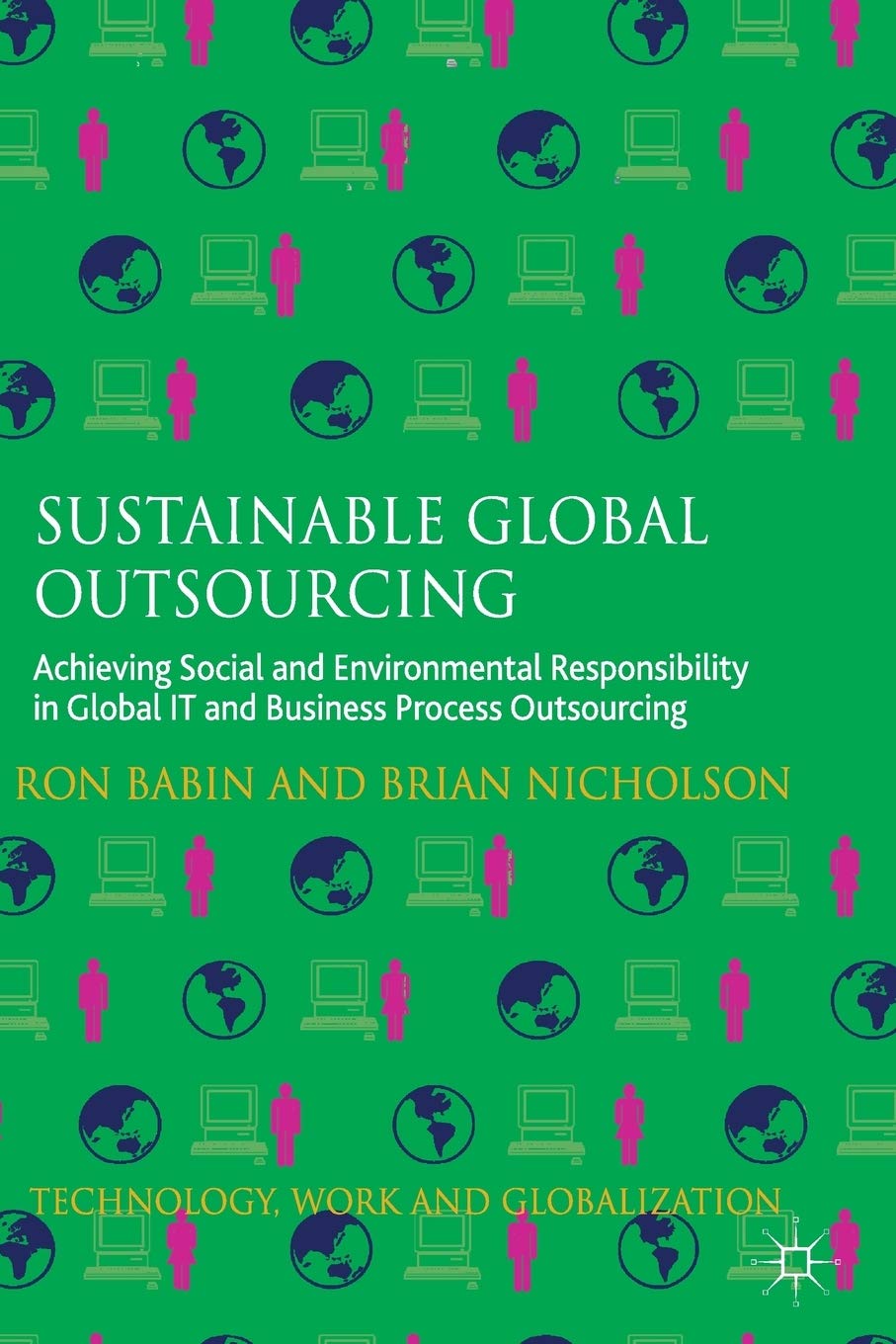Your cart is currently empty!
Tag: Responsibility

The Sustainable Data Center: Innovations in Environmental Responsibility
In today’s digital age, data centers play a crucial role in storing, processing, and managing vast amounts of information. However, the environmental impact of these facilities cannot be ignored. The energy consumption of data centers is significant, and as the demand for data continues to grow exponentially, so does their carbon footprint. In response to this challenge, the concept of the sustainable data center has emerged, focusing on innovations in environmental responsibility to reduce energy consumption, minimize waste, and lower greenhouse gas emissions.One key innovation in sustainable data centers is the use of renewable energy sources. By harnessing solar, wind, or hydroelectric power, data centers can significantly reduce their reliance on fossil fuels and lower their carbon emissions. Many tech giants, such as Apple and Google, have committed to powering their data centers with 100% renewable energy, setting a positive example for the industry as a whole.
Another important aspect of sustainable data centers is energy efficiency. By implementing advanced cooling systems, optimizing server utilization, and using energy-efficient hardware, data centers can minimize their energy consumption and operating costs. For example, many data centers now use hot aisle containment systems and free cooling techniques to reduce the need for air conditioning and improve overall efficiency.
In addition to energy efficiency, sustainable data centers also focus on waste reduction and recycling. By implementing proper e-waste management practices, data centers can ensure that old equipment is properly disposed of or recycled, reducing their environmental impact. Some data centers even repurpose waste heat generated by servers to heat nearby buildings or facilities, further maximizing their efficiency and sustainability.
Furthermore, sustainable data centers are also exploring innovative technologies such as liquid cooling and modular designs to improve their environmental performance. Liquid cooling systems can be more efficient than traditional air cooling methods, while modular designs allow for easier scalability and resource allocation, reducing waste and energy consumption.
Overall, the sustainable data center represents a shift towards greater environmental responsibility in the tech industry. By embracing renewable energy, energy efficiency, waste reduction, and innovative technologies, data centers can reduce their environmental impact and contribute to a more sustainable future. As the demand for data continues to grow, it is crucial that data centers prioritize sustainability and work towards minimizing their carbon footprint. The innovations in environmental responsibility seen in sustainable data centers are a positive step towards a greener and more sustainable digital infrastructure.

The Ethics of Artificial Intelligence: Balancing Innovation and Responsibility
Artificial intelligence (AI) has become an integral part of our daily lives, from virtual assistants like Siri and Alexa to self-driving cars and predictive analytics in healthcare. While AI has the potential to revolutionize industries and improve efficiency, it also raises ethical concerns that must be addressed.One of the main ethical challenges of AI is the potential for bias and discrimination. AI algorithms are only as good as the data they are trained on, and if that data is biased or flawed, it can lead to discriminatory outcomes. For example, AI used in hiring processes may inadvertently discriminate against certain demographics if the data used to train the algorithm is biased. It is crucial for developers to actively work to mitigate bias in AI systems and ensure that they are fair and equitable.
Another ethical consideration is the impact of AI on employment. As AI becomes more advanced, there is a fear that it will replace human workers, leading to job loss and economic inequality. It is important for policymakers and industry leaders to consider the social implications of AI deployment and work to create policies that protect workers and ensure a fair transition to an AI-powered economy.
Privacy is also a major concern when it comes to AI. As AI systems collect and analyze massive amounts of data, there is a risk of privacy breaches and data misuse. It is essential for companies to prioritize data security and transparency in their AI systems to protect user privacy and maintain trust.
In addition to these concerns, there are also questions about the accountability and transparency of AI systems. Who is responsible when an AI system makes a mistake or causes harm? How do we ensure that AI systems are transparent and explainable so that users can understand how decisions are being made?
Balancing innovation and responsibility in the development and deployment of AI requires a multi-faceted approach. Companies must prioritize ethical considerations in their AI development processes, from data collection to algorithm design. Policymakers must create regulations and standards that protect consumer rights and ensure fairness in AI systems. And individuals must be aware of the ethical implications of AI and advocate for responsible AI practices.
Ultimately, the ethics of artificial intelligence are a complex and evolving field that requires collaboration and dialogue between industry, government, and society. By working together to address these ethical challenges, we can ensure that AI continues to drive innovation while upholding ethical principles and values.

The Ethical Dilemma of Autonomous Vehicles: Balancing Innovation and Responsibility
Autonomous vehicles, also known as self-driving cars, have been hailed as the future of transportation. With the potential to increase road safety, reduce traffic congestion, and improve fuel efficiency, it’s no wonder that companies like Tesla, Google, and Uber are investing heavily in this technology. However, as autonomous vehicles become more prevalent on our roads, they bring with them a host of ethical dilemmas that must be addressed.One of the biggest ethical dilemmas surrounding autonomous vehicles is the issue of responsibility. In the event of an accident involving an autonomous vehicle, who is to blame? Is it the manufacturer of the vehicle, the software developer, the owner of the vehicle, or the government that regulates the technology? This question becomes even more complex when you consider that autonomous vehicles are programmed to make split-second decisions that can have life or death consequences.
For example, imagine a scenario where an autonomous vehicle is driving down the road and suddenly a pedestrian steps out in front of it. The car has to make a decision: swerve to avoid the pedestrian and potentially crash into a parked car, or stay on course and hit the pedestrian. Who should the car prioritize in this situation, the pedestrian or the occupants of the car? And who should be held responsible if the decision leads to harm?
Another ethical dilemma of autonomous vehicles is the issue of privacy. These cars are equipped with an array of sensors and cameras that collect vast amounts of data about their surroundings and the people inside them. This data can be used to improve the performance of the vehicle, but it also raises concerns about invasion of privacy. Who owns this data, and how should it be protected from misuse?
Furthermore, there are concerns about the impact of autonomous vehicles on jobs. As more and more tasks are automated, there is a real possibility that millions of people who depend on driving for their livelihoods could be left unemployed. How can we ensure that the benefits of autonomous vehicles are distributed equitably, and that those who are affected by this technological shift are not left behind?
In order to address these ethical dilemmas, there needs to be a balance between innovation and responsibility. Manufacturers of autonomous vehicles must prioritize safety and transparency in their development process, and regulators must establish clear guidelines for how these vehicles should operate on our roads. Additionally, there needs to be a broader conversation about the ethical implications of autonomous vehicles, involving stakeholders from government, industry, and the public.
Ultimately, the ethical dilemmas of autonomous vehicles are complex and multifaceted. As this technology continues to advance, it’s crucial that we approach it with a sense of responsibility and foresight, in order to ensure that the benefits of autonomous vehicles are realized without compromising our values and principles.

Sustainable Solutions: How Data Centers are Leading the Way in Environmental Responsibility
In recent years, the issue of environmental sustainability has become a top priority for businesses across all industries. As concerns about climate change and resource depletion continue to grow, companies are increasingly looking for ways to reduce their environmental impact and operate in a more sustainable manner. One industry that has been particularly proactive in this regard is the data center industry.Data centers are facilities that house computer systems and associated components, such as telecommunications and storage systems. These facilities are essential for the operation of the internet and other digital services, but they also consume a significant amount of energy and resources. As the demand for data storage and processing continues to grow, data centers are facing increasing pressure to find more sustainable solutions.
One of the key ways that data centers are leading the way in environmental responsibility is through the use of renewable energy sources. Many data centers are now powered by wind, solar, or hydroelectric power, which helps to reduce their carbon footprint and dependence on fossil fuels. In addition, data centers are also investing in energy-efficient technologies, such as efficient cooling systems and server virtualization, to further reduce their energy consumption.
Another important aspect of sustainable data center operations is water conservation. Data centers require large amounts of water for cooling and other purposes, and water scarcity is a growing concern in many parts of the world. To address this issue, data centers are implementing water-efficient cooling systems, recycling wastewater, and using advanced water management techniques to minimize their water usage.
Furthermore, data centers are also focusing on waste reduction and recycling. Many data centers are now implementing recycling programs for electronic waste and other materials, as well as working to reduce the amount of waste generated in their operations. By recycling and reusing materials, data centers are able to minimize their impact on the environment and reduce their overall carbon footprint.
Overall, data centers are setting a new standard for environmental responsibility in the business world. By investing in renewable energy, water conservation, and waste reduction, data centers are demonstrating that it is possible to operate a successful business while also protecting the planet. As the demand for digital services continues to grow, it is essential that other industries follow the lead of data centers and prioritize sustainability in their operations. By working together to reduce our environmental impact, we can create a more sustainable future for generations to come.

Navigating the Ethics of Artificial Intelligence: Balancing Innovation and Responsibility
Artificial intelligence (AI) has become a powerful tool that is transforming industries and reshaping how we interact with technology. From self-driving cars to voice assistants, AI has the potential to revolutionize the way we live and work. However, with this great power comes great responsibility. Navigating the ethics of AI is a complex and challenging task that requires careful consideration and thoughtful decision-making.One of the key ethical issues surrounding AI is the potential for bias and discrimination. AI algorithms are only as good as the data they are trained on, and if that data is biased or flawed, it can lead to unfair outcomes. For example, facial recognition technology has been found to have higher error rates for people of color, leading to potential discrimination in law enforcement and other applications.
Another ethical concern is the impact of AI on jobs and the economy. As AI becomes more advanced, there is a fear that it will automate jobs and displace workers, leading to economic inequality and social unrest. It is important for companies and policymakers to consider the implications of AI on society and work towards solutions that ensure a fair and inclusive future for all.
In addition to bias and job displacement, there are also concerns about the potential misuse of AI technology. From autonomous weapons to deepfakes, there are numerous ways in which AI can be used for malicious purposes. It is crucial for companies and governments to establish clear guidelines and regulations to prevent the misuse of AI and protect against potential harm.
Despite these challenges, there is also great potential for AI to be a force for good. AI has the power to improve healthcare, optimize transportation systems, and enhance productivity in numerous industries. By balancing innovation with responsibility, we can harness the full potential of AI while mitigating its risks.
One way to navigate the ethics of AI is through the development of ethical frameworks and guidelines. Companies and organizations should establish clear principles for the design, development, and deployment of AI systems, ensuring that they are transparent, accountable, and fair. By adhering to ethical standards, we can build trust with users and stakeholders and ensure that AI is used for the benefit of all.
In conclusion, navigating the ethics of artificial intelligence requires a delicate balance between innovation and responsibility. By addressing issues of bias, job displacement, and misuse, we can harness the full potential of AI while ensuring that it is used ethically and responsibly. With careful consideration and thoughtful decision-making, we can create a future where AI enhances our lives and benefits society as a whole.

Building a Sustainable Future: How Data Centers are Leading the Charge in Environmental Responsibility
In today’s world, the need for sustainability and environmental responsibility has never been more pressing. With the effects of climate change becoming increasingly apparent, businesses and individuals alike are being called upon to take action to mitigate their impact on the planet. One industry that has been at the forefront of this movement is the data center industry.Data centers are large facilities that house the servers and other infrastructure necessary to support the digital world we live in. These facilities consume vast amounts of energy to power and cool the equipment they house, leading to a significant carbon footprint. However, many data center operators have recognized the importance of reducing their environmental impact and have taken steps to build a more sustainable future.
One way that data centers are leading the charge in environmental responsibility is through the use of renewable energy sources. Many data centers are now powered by solar, wind, or hydroelectric energy, reducing their reliance on fossil fuels and lowering their carbon emissions. In fact, some data centers are even able to generate more energy than they consume, selling the excess back to the grid and further reducing their environmental impact.
In addition to using renewable energy, data centers are also implementing energy-efficient technologies to reduce their overall energy consumption. This includes using advanced cooling systems, optimizing server configurations, and implementing energy management software to monitor and control energy usage. By making these improvements, data centers are able to lower their energy costs and reduce their carbon footprint.
Data centers are also investing in sustainable building practices to minimize their environmental impact. This includes using eco-friendly building materials, implementing water-saving measures, and designing facilities to maximize natural light and ventilation. By incorporating sustainable design principles into their construction and operations, data centers are able to reduce their resource consumption and minimize their environmental footprint.
Furthermore, many data centers are also implementing recycling and waste reduction programs to minimize their impact on the environment. This includes recycling e-waste, repurposing old equipment, and diverting waste from landfills. By taking these steps, data centers are able to reduce their environmental impact and contribute to a more sustainable future.
Overall, data centers are leading the charge in environmental responsibility by implementing renewable energy sources, energy-efficient technologies, sustainable building practices, and recycling and waste reduction programs. By taking these steps, data centers are not only reducing their own environmental footprint but also setting an example for other industries to follow. As the digital world continues to grow, it is essential that data centers continue to prioritize sustainability and environmental responsibility to build a more sustainable future for generations to come.

The Sustainable Data Center: How Companies are Prioritizing Environmental Responsibility
In recent years, there has been a growing trend towards environmental responsibility and sustainability in the business world. Companies are increasingly recognizing the importance of reducing their carbon footprint and minimizing their impact on the environment. One area where this commitment to sustainability is particularly evident is in the data center industry.Data centers are essential to the operation of modern businesses, housing the servers and networking equipment that power everything from websites to cloud services. However, data centers are also notorious for their high energy consumption and environmental impact. According to a report by the Natural Resources Defense Council, data centers in the United States alone consume about 2% of the country’s total electricity usage.
Recognizing the need to address this issue, many companies are now prioritizing sustainability in their data center operations. This includes implementing energy-efficient technologies, using renewable energy sources, and reducing waste and carbon emissions. By doing so, companies not only reduce their environmental impact but also save on energy costs and improve their overall efficiency.
One way companies are making their data centers more sustainable is by investing in energy-efficient infrastructure. This includes using more efficient servers, cooling systems, and power distribution units that consume less energy and produce fewer emissions. Companies are also exploring innovative cooling technologies, such as liquid cooling and free-air cooling, which can significantly reduce energy usage and improve the overall efficiency of the data center.
In addition to energy-efficient technologies, companies are also looking to renewable energy sources to power their data centers. Many companies are investing in solar panels, wind turbines, and other renewable energy sources to offset their electricity consumption and reduce their reliance on fossil fuels. Some companies are even partnering with utility providers to purchase renewable energy credits or enter into power purchase agreements to ensure that their data centers are powered by clean, renewable energy.
Another key focus for companies looking to make their data centers more sustainable is reducing waste and carbon emissions. This includes implementing recycling programs for e-waste, using energy-efficient lighting and equipment, and optimizing server utilization to reduce energy waste. Companies are also exploring ways to capture and reuse waste heat generated by their data centers, such as using it to heat office buildings or nearby homes.
Overall, the shift towards sustainability in the data center industry is a positive development for both businesses and the environment. By prioritizing environmental responsibility, companies can reduce their carbon footprint, lower their energy costs, and improve their overall efficiency. As the demand for data centers continues to grow, it is crucial that companies prioritize sustainability in their operations to ensure a more sustainable future for all.



